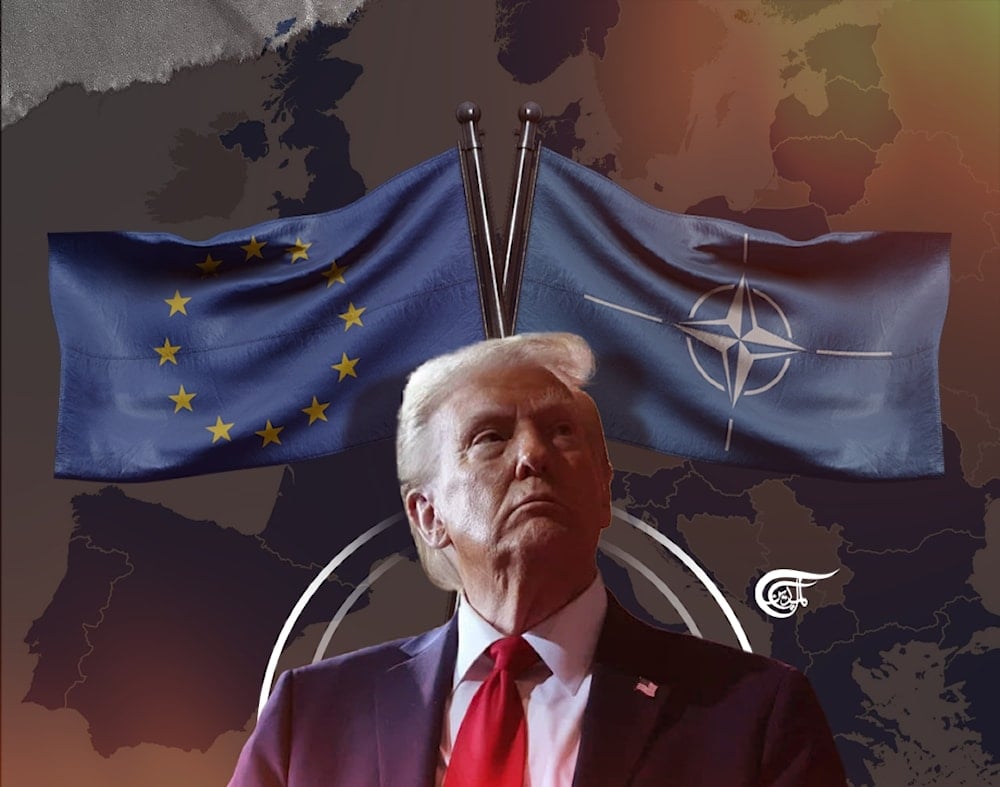Trump’s new approach in foreign policy and European/NATO security concerns
Trump's transactional and unpredictable approach to foreign policy could weaken collective security mechanisms, deepen divisions within NATO, and force Europe to shoulder a greater share of its own defense burden.
-

NATO's unity could be tested, as some European countries may advocate for diplomatic engagement with Russia, while others push for stronger deterrence measures. (Al Mayadeen English; Illustrated by Ali al-Hadi Shmeis)
With Donald Trump’s return to the White House, European nations and NATO members face renewed uncertainties regarding their security and transatlantic relations. His previous tenure was marked by skepticism toward multilateral alliances, a transactional approach to foreign policy, and a preference for bilateral negotiations over collective security agreements. A second Trump presidency could further disrupt the global balance of power, particularly for Europe and NATO.
Trump's America First Doctrine and Its Impact on NATO
One of the most pressing concerns for NATO is Trump’s long-standing criticism of the alliance. During his first term, he repeatedly expressed dissatisfaction with members that failed to meet the 2% GDP defense spending target, even threatening to reduce US military support or withdraw entirely. A renewed Trump presidency may bring heightened demands for greater European financial contributions or even condition US military assistance on specific commitments from European allies.
These developments could significantly alter NATO’s deterrence posture. Increased pressure on member states to boost defense budgets might strain some European economies, while a diminished US commitment to Article 5 (the mutual defense clause) could weaken the alliance's cohesion. Furthermore, internal divisions may emerge, with some nations—such as Poland and the Baltic states—seeking bilateral security agreements with the US rather than relying on collective NATO mechanisms.
A More Lenient Approach Toward Russia?
Another major concern in Europe is Trump’s ambiguous stance toward Russia and Vladimir Putin. While European nations have rallied behind Ukraine with strong financial and military aid, Trump has criticized the extent of US assistance and has suggested that he could "end the war within 24 hours"—potentially by pressuring Ukraine into territorial concessions. And as we can see, the deal between Russia and Ukraine is almost reachable.
A reduction in US military and financial support for Ukraine could shift the burden onto Europe, forcing the EU to take a more active role in Kiev’s defense.
On the other hand, NATO's unity could be tested, as some European countries (like France and Germany) may advocate for diplomatic engagement with Russia, while others (like Poland and the Baltics) push for stronger deterrence measures.
Economic Tensions and Trade Uncertainty
Trump’s foreign policy is also deeply intertwined with economic nationalism. His previous administration imposed tariffs on European goods, including steel and aluminum, and threatened an all-out trade war with the EU, and in the 2nd term of his presidency, we have seen that Trump intensified the trade disputes with Europe, particularly in sectors like automotive manufacturing, agriculture, and technology.
Economic friction between the U.S. and Europe could undermine cooperation on security issues. Europe may accelerate efforts to reduce its reliance on US defense industries and develop its own independent security mechanisms.
A less predictable transatlantic relationship could encourage European countries to diversify their economic partnerships, including closer ties with China.
Middle East Policy and Its Impact on European Security
Trump’s return to power could also have ripple effects on European security due to his unpredictable approach toward the Middle East. If he reinstates his “maximum pressure” campaign against Iran, escalates tensions with China over Taiwan, or reduces US military presence in critical regions, Europe could face secondary security threats.
Potential Consequences:
Increased instability in the Middle East may lead to new migration waves toward Europe, exacerbating political tensions within the EU.
European nations could be forced to take a more independent role in Middle Eastern affairs, including military operations or diplomatic efforts. A potential breakdown in Western unity over Iran policy may also happen as European leaders may seek to preserve diplomacy while Trump pushes for a more confrontational stance.
A More Uncertain Security Landscape for Europe
Trump’s return to the White House represents a major geopolitical shift for Europe and NATO. His transactional and unpredictable approach to foreign policy could weaken collective security mechanisms, deepen divisions within NATO, and force Europe to shoulder a greater share of its own defense burden. While some European nations may view this as an opportunity to strengthen their strategic autonomy, the overall uncertainty could embolden adversaries such as Russia and China.
In response, European leaders may need to accelerate defense spending, enhance regional cooperation, and prepare for a less predictable American security umbrella. Whether this transition leads to a stronger, more independent Europe or a fragmented and vulnerable continent remains one of the most critical questions in global security today.

 Ashkan Mombeini
Ashkan Mombeini
 5 Min Read
5 Min Read










